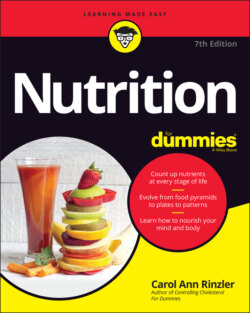Читать книгу Nutrition For Dummies - Carol Ann Rinzler - Страница 70
Every calorie counts
ОглавлениеAlthough your body burns some calories faster than others — your first source of energy is carbohydrates, which you metabolize before fats — people who say that “calories don’t count” or that “some calories count less than others” are usually trying to convince you to follow a diet that concentrates on one kind of food to the exclusion of most others. One common example that arises like a phoenix in every generation of dieters is the high-protein diet.
The high-protein diet, most commonly known today as the Atkins or ketogenic/keto diet, tells you to cut back or even entirely eliminate carbohydrate foods on the assumption that because your muscle tissue is mostly protein, the protein foods you eat will go straight from your stomach to your muscles, while everything else turns to fat. In other words, this diet says that you can stuff yourself with protein foods because no matter how many calories you get, they’ll all be protein calories, and they’ll all end up in your muscles, not on your hips. Wouldn’t it be nice if that were true? The problem is, it isn’t. All calories, regardless of where they come from, give you energy. If you take in more energy (calories) than you spend each day, you’ll gain weight. If you take in fewer calories than you use up, you’ll lose weight. This nutrition rule is an equal opportunity, one-size-fits-all proposition that generally applies to everyone and everybody.
